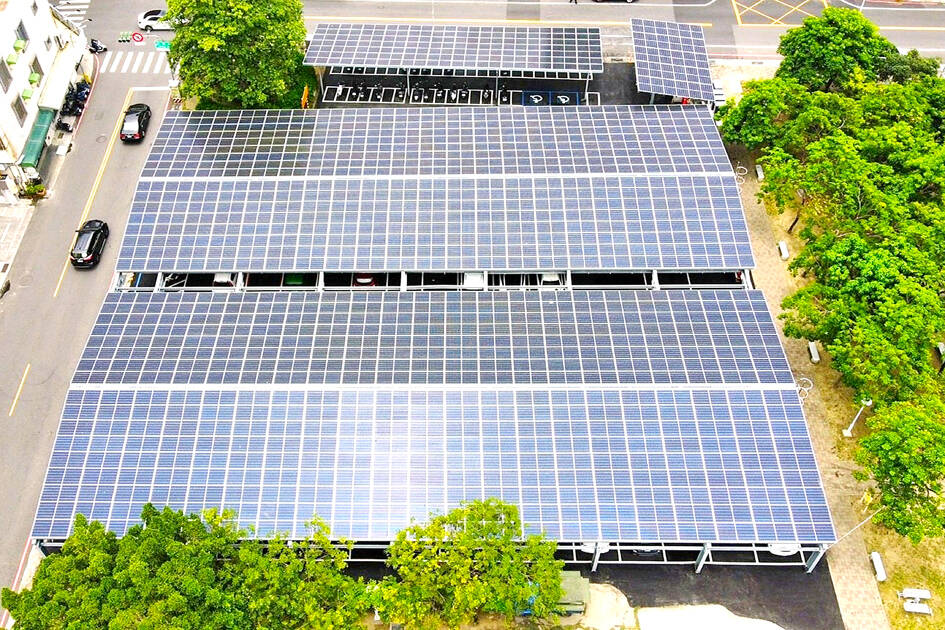Renewable energy sources are expected to make up 10 percent of total electricity production this year, Bureau of Energy officials said, buoying hopes that the nation’s green energy transition will get back on track following years of disappointing progress amid the COVID-19 pandemic.
Last year, more solar farms than any other year were built in Taiwan, and the pace of construction of offshore wind turbines increased as contractors gained experience, the officials said.
These developments — in conjunction with a projection that the nation’s energy consumption would decrease this year — would put Taiwan within reach of the Ministry of Economic Affairs’ revised target of boosting renewable energy sources to 20 percent of electricity production by 2026, they said.

Photo courtesy of Tainan Bureau of Transportation via CNA
The ministry last month extended the deadline for getting 20 percent of the nation’s electricity from renewable sources by a year after delays caused by pandemic-related work and supply chain disruptions.
Under the new plan, solar energy production must be increased from a previous target of 10 gigawatts (GW) to 14GW by the end of the year.
The bureau has installed enough solar panels over fish farms to generate 2.5GW of energy, of which 2GW was integrated into the grid, and 0.5GW is to go online in the next three months, they said.
To expand solar energy production this year, the government would seek to install solar panels over fish farms in Tainan and Chiayi County, low-yield agricultural land owned by Taiwan Sugar Corp (台糖) and at the Changhua Coastal Industrial Park (彰濱工業區), they said.
A new wind farm off southwestern Changhua County is already online, they said.
By the end of the year, three solar farms off Changhua and the Formosa II wind power project off Miaoli County would also be activated, adding 0.8GW to the nation’s energy supply, they said.
The renewable energy sources last year made up 8.6 percent of the nation’s total electricity production, and no significant problems are foreseen in reaching the 10 percent target set for this year, they said.

MAKING WAVES: China’s maritime militia could become a nontraditional threat in war, clogging up shipping lanes to prevent US or Japanese intervention, a report said About 1,900 Chinese ships flying flags of convenience and fishing vessels that participated in China’s military exercises around Taiwan last month and in January last year have been listed for monitoring, Coast Guard Administration (CGA) Deputy Director-General Hsieh Ching-chin (謝慶欽) said yesterday. Following amendments to the Commercial Port Act (商港法) and the Law of Ships (船舶法) last month, the CGA can designate possible berthing areas or deny ports of call for vessels suspected of loitering around areas where undersea cables can be accessed, Oceans Affairs Council Minister Kuan Bi-ling (管碧玲) said. The list of suspected ships, originally 300, had risen to about

DAREDEVIL: Honnold said it had always been a dream of his to climb Taipei 101, while a Netflix producer said the skyscraper was ‘a real icon of this country’ US climber Alex Honnold yesterday took on Taiwan’s tallest building, becoming the first person to scale Taipei 101 without a rope, harness or safety net. Hundreds of spectators gathered at the base of the 101-story skyscraper to watch Honnold, 40, embark on his daredevil feat, which was also broadcast live on Netflix. Dressed in a red T-shirt and yellow custom-made climbing shoes, Honnold swiftly moved up the southeast face of the glass and steel building. At one point, he stepped onto a platform midway up to wave down at fans and onlookers who were taking photos. People watching from inside

Japan’s strategic alliance with the US would collapse if Tokyo were to turn away from a conflict in Taiwan, Japanese Prime Minister Sanae Takaichi said yesterday, but distanced herself from previous comments that suggested a possible military response in such an event. Takaichi expressed her latest views on a nationally broadcast TV program late on Monday, where an opposition party leader criticized her for igniting tensions with China with the earlier remarks. Ties between Japan and China have sunk to the worst level in years after Takaichi said in November that a hypothetical Chinese attack on Taiwan could bring about a Japanese

STREAMLINED: The dedicated funding would allow the US to transfer equipment to Taiwan when needed and order upgraded replacements for stockpiles, a source said The US House of Representatives on Thursday passed a defense appropriations bill totaling US$838.7 billion, of which US$1 billion is to be allocated to reinforcing security cooperation with Taiwan and US$150 million to replace defense articles provided to the nation. These are part of the Consolidated Appropriation Act, which the US House yesterday passed with 341 votes in favor and 88 against. The act must be passed by the US Senate before Friday next week to avoid another government shutdown. The US House Committee on Appropriations on Monday unveiled the act, saying that it allocates US$1 billion for the Taiwan Security Cooperation Initiative